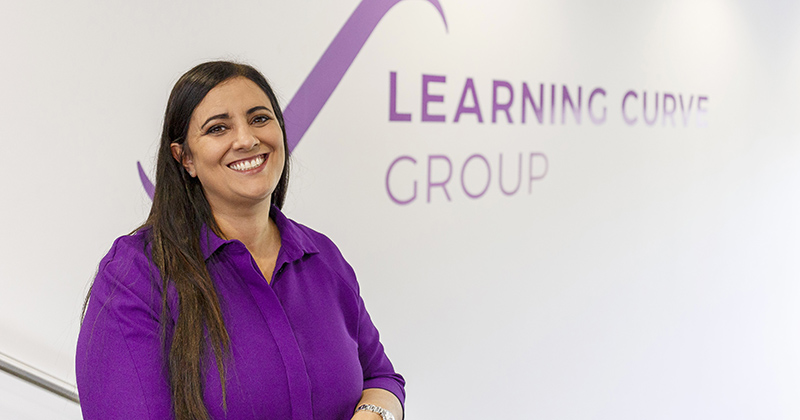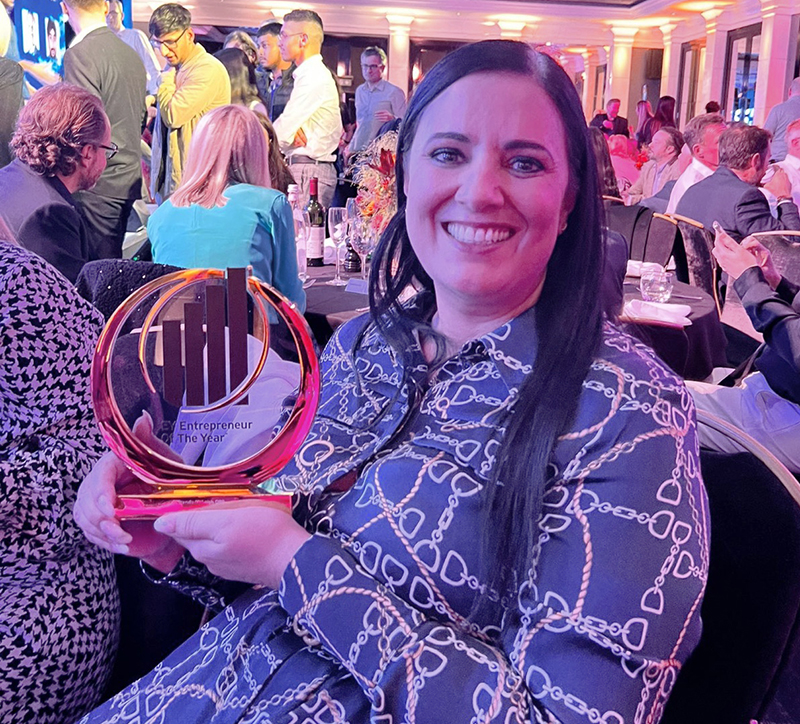From PA to chief executive, Brenda McLeish has risen through the ranks to run one of the country’s largest and most successful training companies, grabbing numerous awards and accolades in the process. Trading conditions in the training sector are tougher than ever, but that won’t stop the ‘purple people’ from going for growth, she tells Jessica Hill.
With over 1,000 employees and 4,500 employer clients on her books, Brenda McLeish is the chief executive of one of the country’s largest training providers.
But this month, she’s relying on trains and taxis to get around Teesside after leaving her car in the garage before builders started digging up the foundations of her driveway. The car is now it’s stuck there until the work is done.
“How can you run a £75 million business and not think about these things?” she recalls her husband chiding her.
And what a month it’s been. Just a few weeks ago, McLeish was being invested with her OBE by the Prince of Wales for services to further education. “The dedication and hard work of our purple people made this happen,” McLeish said at the time.
Far from transport woes being the top concern of the day, McLeish is very much focused on LCG’s employees – or the “purple people”, as they describe themselves.
The term was coined by staff after a company rebrand changed the colour of the logo from orange to purple in 2012. And it’s everywhere at LCG’s offices in County Durham, from festive decorations to the fresh flowers on reception and a large screen above it showing LCG learners against a purple background, sharing life-affirming messages.
McLeish’s taxi driver this morning remarked as they arrived that “I don’t know what the boss is doing, but every time I pick somebody up from here, they’re always happy” she tells me.
While it would be easy to fob the comment off as a clever piece of PR, there is a chipperness in the purple people I meet. Some of that is driven by McLeish’s own effervescent demeanour and the way she cares for her staff.
Remembering roots
“There’s no switch you can turn off to take that Northern girl out of out of me and make me forget where I’ve come from,” she says.
The office is only a half hour drive away from the Stockton council housing estate where McLeish grew up, in a region with the highest rate in England (8.4 per cent) of economically inactive adults due to ill health.
Helping those people grasp opportunities is something McLeish cares deeply about. She recalls one LCG learner – an alcoholic in an abusive relationship who had had her children taken off her – who is now training to be a midwife.
“Slowly changing the world, that’s what makes these purple people here buzz. They can genuinely see they’ve changed people’s lives every day.”
Post-pandemic lull
The offices are also buzzing because of the sheer number of staff there – McLeish told them all to return to the office as soon as they could post-pandemic, and believes the work from home culture “isn’t good for society or business”.
But LCG’s face-to-face businesses are still “nowhere near” pre-Covid levels. Attendance at physical academies and community-based provision is down in volume by at least a third, with people “genuinely not re-presenting into venues” because “they’ve got used to being at home, whether it’s because they’re scared or have underlying health conditions”.

The pandemic has also been damaging for the apprenticeships side of the business: government data shows apprenticeship starts in 2021-22 were 11 per cent down on 2018-19 nationally.
“How can a company take on young school leavers in an office where nobody’s working consistently? That’s a real challenge for us,” says McLeish.
But at least that’s been offset by LCG’s booming online learning business, which doubled in volume during the pandemic, buoyed by the company’s ‘educate whilst you isolate’ campaign.
Also noticeable is that all those purple people wandering about smiling are women. In fact, 80 per cent of McLeish’s senior team is female. She denies “trying to create a female bias”, stressing “it’s because they’re great at what they do”.
Interesting career path
McLeish always had a natural leaning towards education. In one school report, her teacher remarked on her career path that “I’ll see you in the classroom”.
“I didn’t have the greatest of upbringings. I was quite gifted academically but couldn’t afford university because I needed to earn money,” she says.
After a short stint as a medical secretary, McLeish got a job as a college PA at Eastern College and rose through the ranks to become a senior manager at 28.
While coordinating teachers there, McLeish got her adult teaching certificate and taught night classes in basic IT skills so she could “fully understand what I was asking other people to do”.
LCG has grown rapidly since McLeish joined as business development director in 2008, when as a team of 40 “everybody was expected to pitch in”. In 2015, the year McLeish became chief executive, LCG’s founders sold it in a deal backed by private equity, and it has since bought up eight other businesses.
Broadening the reach
McLeish credits its growth choices for the company’s survival in a notoriously tough training provider market. “Without quantity of scale and investment, it’s often really difficult to financially manage all those different audits, funding and Ofsted requirements,” she says.
The new businesses have broadened LCG’s offer. Its 2015 purchase of Hartlepool-based Workwise, a call centre of 30 staff, meant the company became “less dependent on external companies” to find new learners.
But there have been bumps in the road. Last year, LCG bought training provider Antrec Limited, which, among other things, provided taxi driver preparation courses in the Liverpool City Region. But in May the combined authority did not give LCG a contract in its latest adult education budget bidding round – despite an outcry from a local council LCG was working with – and McLeish had to shut the Liverpool office down.

Bringing London Hairdressing Apprenticeship Academy into the fold in 2020 gave LCG a foothold in the hair and beauty training market in the capital, and its most recent acquisition this summer, of Yorkshire-based White Rose Beauty Colleges, makes it now one of the biggest beauty trainers in the country.
In an adjoining office room, purple people are liaising with representatives from the awarding body VTCT about “being the biggest [in that market] and how we can strengthen that relationship,” McLeish explains.
But while White Rose are rated outstanding by Ofsted and are “absolutely fantastic at what they do in the classroom”, McLeish admits when LCG took them on they were “really struggling without that bigger piece around funding, administration and marketing … they were drowning in all the other challenges that sit outside the classroom”.
She explains: “We often find when we bring in new businesses that the provision is brilliant, but all the external factors are suffocating the business.”
Getting back to work
McLeish is scathing of some back-to-work programmes.
She recalls in her college days English and maths lessons were “like a social clubs” and claims most unemployed people LCG works with “could teach you how to write a CV – you don’t need to teach them – because every bloody job centre programme is just regurgitating that stuff”.
“We truly believe in giving people skills they can use to transform their lives, whether that’s just being able to help their children with their homework or to break that [unemployment] cycle,” she says.
But reversing a culture of entrenched unemployment is tough. LCG has a construction academy in Middlesborough, but McLeish admits after learning those skills many trainees will “earn a little bit of money on the black market and continue to draw down benefits”.
“A lot of people say to us that to come off of benefits they’d need to be earning £25,000 pounds a year. They say, ‘I’ve never worked all my life. Where am I going to get a job earning that?’ That’s the cycle, isn’t it? It’s not their fault.”
But there are some bucking that trend. McLeish recalls one former student, a man on benefits who had never worked. His two school leaver sons were destined for the same fate when McLeish says he told LCG he wanted to “do something with my sons because I don’t want them sitting on their asses like I did”.
All three entered a plastering course, and although one son fell by the wayside the other two qualified and eventually set up their own company.
Expanding apprenticeships
McLeish has ambitions to expand LCG’s apprenticeships portfolio, which means “engaging with those people still scared to leave the house”.
LCG practises what it preaches to businesses through its Purple People Academy, which in 2018 took on 30 school leaver apprentices, and McLeish claims “many employers have taken on that blueprint in their own businesses”.
It is also exploring what McLeish believes are “massive opportunities” working with offenders in prison and when they’re being rehabilitated, following a recent law change enabling some prisoners to undertake apprenticeship programmes.
The company is also a publisher, and currently develops and sells 200,000 learning resources a year in England. LCG has eight PRNs and is inspected and audited on each, which McLeish admits “keeps us on our toes”. Thankfully, five Ofsted inspections in the last 12 months all came out ‘good’ and ‘outstanding’.
But some competitors have buckled under market pressures. HGV training provider Systems Group Ltd last month called in administrators. Lifetime Training was bought by one of its lenders as an audit investigation by the Education and Skills Funding Agency into its use of additional learning support funding was about to commence.
Now, of LCG’s 60 online qualifications, the five mental health programmes are the best performing, seeing a third of its online programme registrations. It will come as no surprise that the most popular course is mental health in young people. McLeish expects demand for mental health courses to remain high as the recession bites, with “the world at the minute demanding it”.
‘Massive opportunities’

The recession is causing employers to pull back on paying for training, but McLeish believes many companies remain ignorant of the “massive opportunities” offered by government funded training programmes.
“We’re trying to say to employees ‘don’t write us off, use the apprenticeship levy, the adult education budget or one of the boot camps to fund your training requirements, rather than your cold, hard cash’. To this day, even [apprenticeship] levy paying employers tell us they didn’t know they could do it all for free.”
The downturn is also affecting LCG’s staff, despite their buoyant appearance. Instead of throwing the usual Christmas office party, staff are getting a voucher for £30 – the equivalent per head cost of the party – and an advent calendar.
Furthermore, McLeish is determined “nobody is ever going to go hungry in this business,” with free breakfasts for students in the academies and free fruit for all staff.








Your thoughts